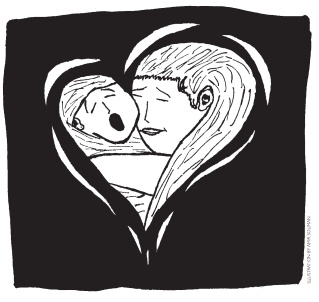
Reporting by Dominique Arrington and Jeanette Vega
Dealing with child welfare can be a scary and shameful experience. Mothers who become pregnant when they already have children in foster care feel particularly vulnerable, because their babies are at high risk of being removed right from the hospital.
In 2013, The Bronx Defenders, a New York City legal organization, created Healthy Mothers, Healthy Babies to support these moms.
The program offers weekly support groups, advocacy and referrals. It even connects moms to doulas, who can be there during birth. One of the best things is that moms who have succeeded in bringing their newborns home can help moms who are still pregnant.
Here, Jennifer Bronson, coordinator of Healthy Mothers, Healthy Babies, and Tiffany Muskelly, a former participant, explain the program:
Q: Why did you start Healthy Mothers, Healthy Babies?
Jennifer: Once a baby is born to a mother with a child already in foster care in New York City, her caseworker has to hold a “child safety conference” to determine whether that baby will go home or into foster care. But a lot of our parents thought CPS would automatically take their baby and there wasn’t anything they could do.
We saw that many women who were doing well planning for their children in foster care stopped visiting or seeking out services because they were trying to hide their pregnancy. We wanted to make sure mothers had accurate information about what would happen once their baby was born.
Tiffany: When I started attending the program, I had three kids in foster care and I was 6 or 7 months pregnant.
Before I started, I had support from my daughter’s father, my mother, my sister and from staff at my agency. I was also going to drug treatment programs, parenting classes and classes for children with special needs.
But I still didn’t feel like I had anybody to talk to about this new baby and I was scared. I thought CPS was going to snatch my baby. I tried not to let people even know I was pregnant until my stomach got outrageously big.
I also didn’t want to share my feelings about what was going on with family and friends, because I didn’t want them to be like, “Oh, why you let this happen?” I didn’t want them to put the blame on me. Nobody in my family had had children in foster care. Nobody experienced not hearing their children through the house saying, “Mommy, Mommy, Mommy.”
Q: What services do you connect parents to, and what do you do in the group?
Jennifer: We connect moms to services like parent-child therapy, home-visiting and inpatient mother-child substance abuse programs, so they already have supports in place when the baby is born.
In the support group we do workshops on whatever moms want to learn, from reproductive rights to healthy cooking. Moms also share their experiences. They tell each other about services. Mothers who have already given birth explain exactly what happened when CPS visited them. They even motivate each other to make a backup plan if their baby can’t go home, so that the baby can still be with family. That gives them more opportunities for early bonding, breastfeeding and attachment.
Tiffany: When I first came to the group, I was a little nervous. I sat and heard everybody’s story before I started telling mine.
But really, I wanted everybody in the group to know my situation, because what I was going through was what they were going through. When I started speaking, it felt like a big relief.
One of the things I liked most was being able to help other mothers. Being that I was at the end of my pregnancy and the end of getting my other kids back, I had a lot to share. If someone didn’t have stable housing, or was having problems using, I’d tell them, “Go get yourself in shelter,” or, “Go put yourself in a program. Don’t wait for child welfare to tell you what you have to do.” I felt proud that I could help.
Q: What support does the program offer moms at birth?
Tiffany: Before I gave birth, Jennifer walked me through the steps. She also arranged a meeting with CPS right before my delivery. CPS told me they surely didn’t have any concerns about my baby coming home. That helped me feel less scared.
But I was still scared when the investigator came to my hospital room when my baby was not even 2-3 hours old. I got sad and depressed. I started crying. The investigator told me I’d better not run with my child or they’d put out a warrant for my arrest.
Then I called Jennifer and she let the investigator know I was doing everything I was supposed to. When they hung up, the investigator said, “I’m sorry, I didn’t mean to scare you.” After that she became real friendly and we made a connection.
Q: Do the relationships moms make continue after they leave the program?
Tiffany: I’m still in touch with four of the moms. Sometimes we go out or watch movies. One mom lives right behind me and comes over sometimes.
Jennifer: Last week, I saw one of the moms Tiffany is still in touch with, who has been struggling. One of the first things she told me was how helpful it was to see Tiffany and how much of an inspiration she is. It’s exciting to hear that moms are making their own community outside the group.
